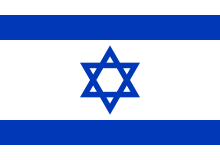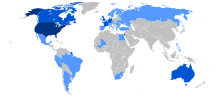
A | B | C | D | E | F | G | H | CH | I | J | K | L | M | N | O | P | Q | R | S | T | U | V | W | X | Y | Z | 0 | 1 | 2 | 3 | 4 | 5 | 6 | 7 | 8 | 9
ישראלים إسرائيليين | |
|---|---|
 | |
 Map of the Israeli diaspora | |
| Regions with significant populations | |
| Israel | c. 9.8 million (including occupied territories)[1] |
| United States | 106,839[2] – 500,000[3][4] |
| Russia | 100,000 (80,000 in Moscow)[5][6] |
| India | 40–70,000[7] |
| United Kingdom | 11,892[8] – 50,000[8][9][10] |
| Canada | 21,320[11] |
| Australia | 15,000[12] |
| Netherlands | 10,371[13] |
| Germany | 10,000[14][15][16] |
| Languages | |
| Hebrew (official) Arabic (recognized) English, Russian, French, Amharic, Tigrinya, various others (see languages of Israel) | |
| Religion | |
| Majority: Judaism Minority: Islam, Christianity, Druzism, Samaritanism, Baháʼí Faith | |
Israelis (Hebrew: יִשְׂרְאֵלִים, romanized: Yīśreʾēlīm; Arabic: إسرائيليين, romanized: Isrāʾīliyyīn) are the citizens and nationals of the State of Israel. The country's populace is composed primarily of Jews and Arabs, who respectively account for 75 percent and 20 percent of the national figure; followed by other ethnic and religious minorities, who account for 5 percent.[17]
Early Israeli culture was largely defined by communities of the Jewish diaspora who had made aliyah to British Palestine from Europe, Western Asia, and North Africa in the late-19th and early-20th centuries. Later Jewish immigration from Ethiopia, the states of the former Soviet Union, and the Americas introduced new cultural elements to Israeli society and have had a profound impact on modern Israeli culture.
Since Israel's independence in 1948, Israelis and people of Israeli descent have had a considerable diaspora, which largely overlaps with the Jewish diaspora but also with that of other ethnic and religious groups; it is estimated that almost 10 percent of the general Israeli population lives abroad, particularly in Russia (with Moscow housing the single largest Israeli community outside of Israel), India, Canada, the United Kingdom, the United States, and throughout Europe.[18]
Population
As of 2013, Israel's population is 8 million, of which the Israeli civil government records 75.3% as Jews, 20.7% as non-Jewish Arabs, and 4.0% other.[19] Israel's official census includes Israeli settlers in the occupied territories[20] (referred to as "disputed" by Israel). 280,000 Israeli settlers live in settlements in the Israeli-occupied West Bank,[20] 190,000 in East Jerusalem,[20] and 20,000 in the Golan Heights.[21]
Among Jews, 70.3% were born in Israel (sabras), mostly from the second or third generation of their family in the country, and the rest are Jewish immigrants. Of the Jewish immigrants, 20.5% were from Europe and the Americas, and 9.2% were from Asia, Africa, and Middle Eastern countries.[19] Nearly half of all Israeli Jews are descended from immigrants from the European Jewish diaspora. Approximately the same number are descended from immigrants from Arab countries, Iran, Turkey and Central Asia. Over 200,000 are of Ethiopian and Indian-Jewish descent.[22]
The official Israel Central Bureau of Statistics estimate of the Israeli Jewish population does not include those Israeli citizens, mostly descended from immigrants from the Soviet Union, who are registered as "others", or their immediate family members. Defined as non-Jews and non-Arabs, they make up about 3.5% of Israelis (350,000),[23] and were eligible for Israeli citizenship under the Law of Return.[24][25]
Israel's official language is Hebrew, which serves as the language of government and is spoken by the majority of the population. Arabic is spoken by the Arab minority and by some members of the Mizrahi Jewish community. English is studied in school and is spoken by the majority of the population as a second language. Other languages spoken in Israel include Russian, Yiddish, Spanish, Ladino, Amharic, Armenian, Romanian, and French.[26]
In recent decades, between 650,000 and 1,300,000 Israelis have emigrated,[27] a phenomenon known in Hebrew as yerida ("descent", in contrast to aliyah, which means "ascent"). Emigrants have various reasons for leaving, but there is generally a combination of economic and political concerns.
Ethnic and religious groups
The main Israeli ethnic and religious groups are as follows:
